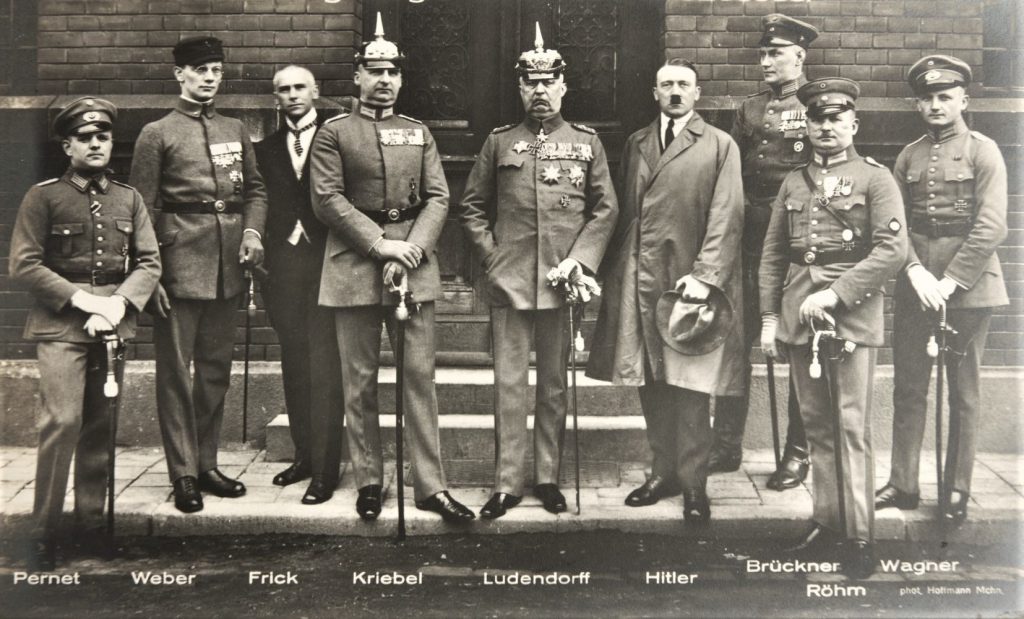On November 8, 1923, at around 8:30 pm, Adolf Hitler and his armed bodyguards of the SA surrounded the Bürgerbräukeller Beer Hall in Munich, Germany. Along with his bodyguards, when Hitler barged into the Beer Hall, he immediately fired his gun into the ceiling and shouted, “The National Revolution has begun. This building is occupied by six hundred heavily armed men. No one may leave the hall. Unless there is immediate quiet I shall have a machine gun posted in the gallery.”1 Hitler proclaimed that both the Bavarian and German Reich governments had been removed and there was now a provisional government being set up. Many of those present in the Beer Hall did not know what to believe. One thing that they were sure of was that the rifles and machine guns were real, so some followed Hitler’s orders. Though many were in amazement, there were some businessmen who were very upset, and one that even yelled for Hitler to shoot. However, others feared for their lives, afraid that a massacre was about to occur.2

The event underway has come to be called the Beer Hall Putsch. A Putsch is simply the German word for a military takeover of the government, or, in French, a coup d’etat.3 The idea for this Putsch came to Hitler from Benito Mussolini, who had staged a triumphant March on Rome in 1922, just the year before. Many of Mussolini’s followers were lower-middle-class Italians, and with their help, he threatened to take over the Italian government with his Fascist march on Rome. Like other Italian populist leaders before him, he put his reputation at risk in order to obtain power. If Mussolini’s march were to fail, he could lose his status in society, along with his respect.4 Mussolini’s first step was to create his own government. Without one, he would have no means to take over; so fascist militias and thugs began gathering from all over Italy.5 Once Mussolini gained power, he began to turn Italy into a Fascist state.6 Hitler imagined orchestrating a similar March on Rome that would start for Berlin from Munich’s famous Odeonsplatz the following morning, November 9, 1923. Odeonsplatz was just a few blocks away from the Bürgerbräukeller Beer Hall where Hitler and his assembled men had gathered that night.7

Through the Beer Hall, Hitler managed to push his way to the front of the hall where he took charge of the crowd. “He then ordered the Bavarian triumvirate—von Lossow, von Seisser, and von Kahr—into an adjoining room, where he bullied them at gunpoint into backing his putsch.”8 The three men were all government officials: Lossow was a general major, Kahr was the Minister President of Bavaria and Colonel, and Seisser was head of the Bavarian state police. Though they were already government officials, Hitler apologized to the men for the interruption on their speech and made a promise to them that they would have good jobs while he was in power. Hitler wanted the triumvirate on his side so that his Putsch would have the backing of actual government officials. However, when he tried to scare the three men into supporting the coup, it didn’t quite work, and they refused to talk or give any information that would give Hitler confidence that he had turned them. He then waved his pistol at them and shouted, “I have four shots in my pistol! Three for you, gentlemen. The last bullet for myself!”9 Though he really didn’t have their full support, Hitler believed he did. Once he thought he had the officials in control, Hitler would return to the crowd and give a speech. The audience went crazy over the speech. Their enthusiasm showed Hitler that he had already won them over. With Ludendorff being around as well, he had their support even more, because Ludendorff was respected and very well-known. Hitler’s first few steps had been made and the Putsch was, so far, going as planned, or so he thought.
So by this point, the Putsch had officially begun, and even though it had just begun, many problems were already occurring for Hitler. One way that Hitler planned for his Putsch to work was by seizing communication centers and state offices in Munich, and using the triumvirate to coordinate the military and police efforts to come. “While the rebels temporarily took over some offices, including the municipal headquarters of the Reichswehr and Munich police headquarters, they failed to secure other key centers.”10 The telegraph office was one key center they failed to seize, which allowed for news of the Putsch to get to Berlin and for orders to be received from General von Seeckt at Berlin military headquarters.11

The triumvirate, which were the three government officials, was left to Erich von Ludendorff to deal with. Ludendorff was currently Deputy Chief of Staff to the German Second Army under General Karl von Bülow. But more importantly, Ludendorff had been one of the most important generals for Germany during the first World War, and was hailed by many Germans as not only a war hero, but also as one of the most patriotic Germans of the day. Because Ludendorff was in such a high position in the army, Hitler wanted to use him as a figurehead in the march and even asked him to lead it. Ludendorff was also able to convince the triumvirate to follow Hitler’s orders, and in return, Hitler would give them the political roles that they wanted in the future government. Ludendorff then freed them, and once they were free, they immediately began planning to respond to the Putsch. Since Hitler and his followers had failed to seize all key centers, such as the ones in the city, the triumvirate was able to call suburban troops and police to Munich. Because these authorities knew what Hitler was doing, they planned well to meet him and his troops in the morning. In the time that they planned out what they would do, Hitler doubted for several hours whether he should continue the march to Berlin, because he found out about the betrayal of the triumvirate. Hitler delayed the start of the march for so long that the Bavarian authorities knew exactly what to do to defend Munich.12
“In a last ditch effort to rally citizens and soldiers, Hitler led around 2,000 Nazis and other Kampfbund members in a march to the Feldherrnhalle on the Ludwigsstrasse.”13 When the march reached Odeonsplatz, the marchers and Munich law enforcement met. There was a shootout where fourteen Nazis and four police were left dead at the scene; however, the march completely ended there and all the rebels fled from the scene. Later on, another two Nazis died, with the march being a complete failure.14
Eventually, Ludendorff was not charged at all, whereas Hitler was put on trial for treason and found guilty. “Hitler was sentenced to five years imprisonment in the old fortress of Landsberg and was eligible for parole after serving six months.”15 He was sent to jail on April 1, 1924, and was released a little less than nine months later, on December 20. Though many would think being imprisoned was terribly bad, Hitler, unlike many, received special treatments and in just the few months that he was incarcerated he was allowed frequent and constant visitations. During that time, he also wrote his manifesto, Mein Kampf.16 What did Hitler learn from this episode of the Beer Hall Putsch? He learned that if you want to take power in Germany, a Putsch is not the way. Beginning in his Landsberg prison cell Hitler began plotting his next move. He would come to power in Germany, not through an illegal Putsch, but through the legal means of the ballot box.
- William L. Shirer, The Rise and Fall of the Third Reich (New York: Simon and Schuster, 1960), 68. ↵
- William L. Shirer, The Rise and Fall of the Third Reich (New York: Simon and Schuster, 1960), 68. ↵
- ”Holocaust Encyclopedia (DC: Washington), s.v. “Beer Hall Putsch (Munich Putsch).” ↵
- Jennifer Stock, “Benito Mussolini Marches on Rome,” Global Events: Milestone Events Throughout History, Vol. 4: 339. ↵
- Jennifer Stock,”Global Events: Milestone Events Throughout History, Vol. 4, “Benito Mussolini Marches on Rome,” 2017: 339. ↵
- Gale Encyclopedia of American Law, 2010, s.v. “Benito Mussolini,” by Donna Batten. ↵
- Charles Keserich, “The Fiftieth Year of “March on Rome”: Recent Interpretation of Fascism,” The History Teacher, Vol. 6. No. 1 (Nov 1972): 135. ↵
- Holocaust Encyclopedia (DC: Washington), s.v. “Beer Hall Putsch (Munich Putsch).” ↵
- Ian Kershaw, Hitler: A biography (Wells Street, London: W.W. Norton Company, 2008), 128. ↵
- ”Holocaust Encyclopedia (DC: Washington), s.v. “Beer Hall Putsch (Munich Putsch).” ↵
- William L. Shirer, The Rise and Fall of the Third Reich (New York: Simon and Schuster, 1960), 71. ↵
- ”Holocaust Encyclopedia (DC: Washington), s.v., “Beer Hall Putsch (Munich Putsch).” ↵
- Holocaust Encyclopedia (DC: Washington), s.v. “Beer Hall Putsch (Munich Putsch).” ↵
- Holocaust Encyclopedia (DC: Washington), s.v., “Beer Hall Putsch (Munich Putsch).” ↵
- William L. Shirer, The Rise and Fall of the Third Reich (New York: Simon and Schuster, 1960), 78. ↵
- William L. Shirer, The Rise and Fall of the Third Reich (New York: Simon and Schuster, 1960), 78. ↵



54 comments
Christopher Morales
You told this story very well. I never knew about this part of Hitler’s life. It is interesting to see how he was influence through figures and reading. He attempted to take Germany as a predetermined move that would give him the power he desired. This story is one I never heard and find it interesting that he served time and how he had special treatment. I always think about all the little things that could have happened that would have prevented his rise and this story raises a bunch.
Jared Sherer
This article is laser-focused on the Putsch and describes the action in vivid detail. The action packed event and its context in 1923 is handled well. The example of Mussolini in Italy the year before makes sense, but Hitler and his cohorts forgot some key elements to taking over a country’s government, primarily the communications. This allowed the current government to respond to and put down the putsch. It would have been easy for the author to go into the rise of Hitler’s government after his short prison stay, but wisely the article stayed with the story – the putsch. This was a very good, detailed article about a specific historical event, written in an interesting and engaging way.
Peter Alva
I love this article because it’s not talked about enough, There were clear red flags in Hitler. It was clear as day that he believed that he was the only one to rule and take over Germany. Given the fact that he was literally proven that he was a tyrant on the big political stage in Germany and they did nothing to prevent him from getting into power.
Barbara Ortiz
This was a very interesting article about the earlier attempt by Hitler to stage his own takeover like Mussolini. It also make you wonder what might have happened if either they had not tried him or treason, or if perhaps treason carried steeper penalties beyond being able to be eligible for parole in 6 months. If he wasn’t tried, would we have his manifesto? If he was incarcerated longer, would the holocaust still have occurred?
Brandon Vasquez
This was a great article with a great introduction that wanted me to keep reading. We all know Hitler eventually rose to power but he also failed and could’ve been put away if it wasn’t for his gaining popularity. Just thinking about if this takeover would’ve been successful how different the world would have been. Would the atrocities happen sooner with less advanced technology and failing economies?
Sydney Nieto
Good article, I was hooked by the introduction, which caused me to keep reading. It was interesting to see how Hitler tried to do something like what Mussolini had done to take over Germany, but ultimately had failed. Not only had he failed but he was betrayed, which was surprising since I thought everyone feared him. Although Hitler had gone to prison that didn’t stop him from plotting to take over Germany.
Hailey Koch
You did a great job on your article it was very informative and I really enjoyed learning all about your topic. The beer putsch basically meant a takeover. This is because putsch in german meant a military takeover of the government. Hitler got the idea of this takeover from Benito because of an event that had occurred a year before. When the event began, it didn’t start very smoothly; a lot of issues had occurred for Hitler.
Anna Steck
This is a really interesting article. I am familiar with this event, but it was interesting to get some more details on it. What it really shows is the intense grip that Hitler had on the minds and ideals of the public. They loved him. He suffered very few consequences for trying to take over the government and failing. This allowed him to do so successfully in the future. Great clear and interesting article.
Anayetzin Chavez Ochoa
This part of history is fuzzy to me since we’re only taught the big picture until University. I didn’t know one of the most infamous men in history was arrested after a long trial of attempting to gain powerful support, only to fail. What would’ve happened if the Putsch worked? Would the disasters of World War 2 happened sooner? A chilling mystery indeed, but nonetheless, thank you for writing this! It was succinct and to the point!
Sofia Perez
Interesting article, thank you! I am completely unaware of this incident. It’s remarkable how high-ranking Munich officials betrayed Hitler, leading to Ludendorff receiving a 5-year prison sentence for treason. Hitler had time to think during this period, and he discovered that a putsch was not the best option to seize power in Germany. On December 20, 1924, Hilter was released from prison and shortly after used the legal process of the election to take power in Germany.